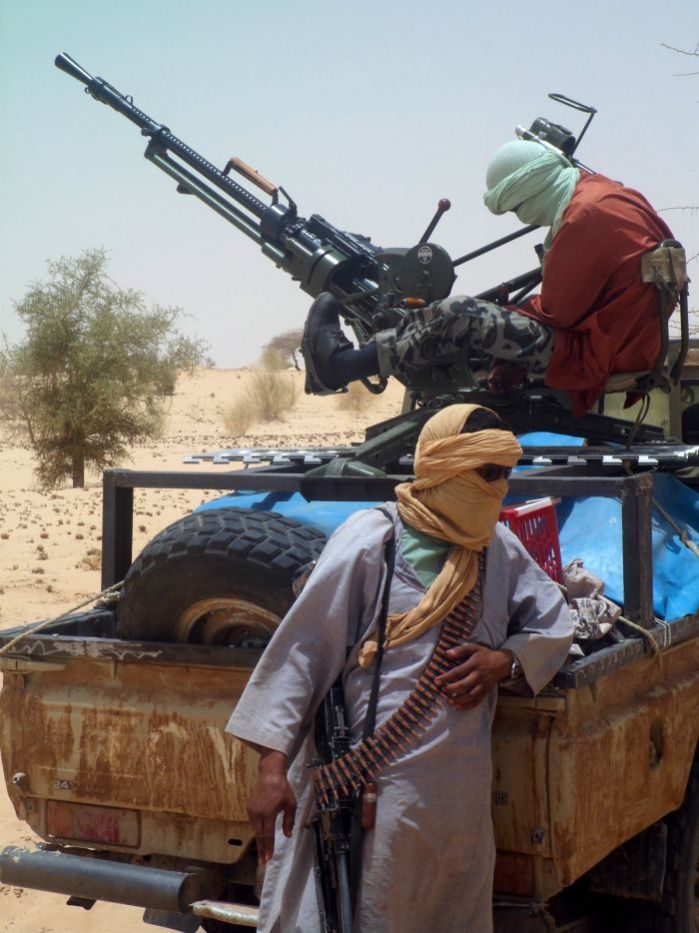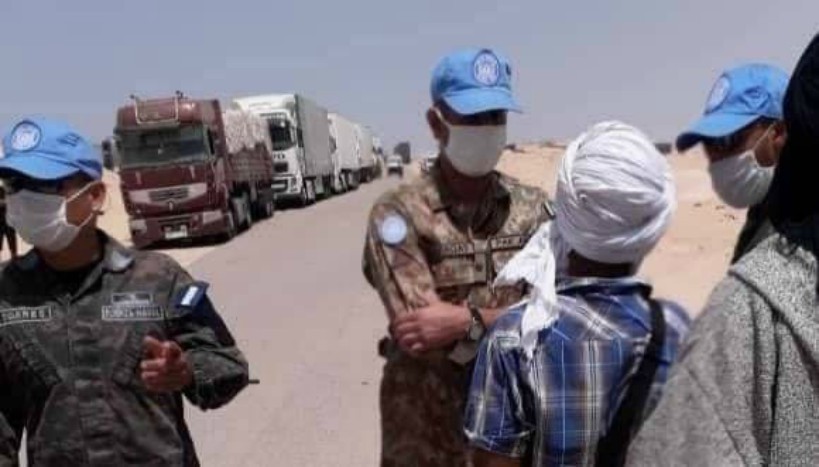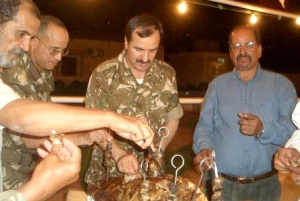All Africa
After months of open and overt diplomatic and other pressures by the international mediation on the belligerents, the remaining Malian parties have finally met and formally signed a new Peace Agreement on 20 June 2015 in Bamako. Presently, however the real cause of fear in Mali, and in the region as a whole, should be the continued expansion and deepening as well as the further transformation of the Sahel Sahara crisis.
New approach to an old crisis
Laudable efforts have been undertaken to conclude the 20 June Peace Agreement. As is known, it was already signed by the government and its national armed allies on 15 May 2015. Achieving this objective was not easy and there are serious hopes that this last exercise will be different from the previous ones. However, once the signing was formalized, a hard question remains lingering on many minds: and so what? In other worlds, following the Peace Agreements of 1991 in Tamanrasset, the 1992 Pacte National , the 1996 Flamme de la Paix and the Alger Agreement of 2006, the 20 June Document is indeed not the first inter Malians Peace settlement.
The mediation and the supporting international community have to prepare themselves for possible disappointments. Indeed, from their own experience, made over the last four decades, Malians would not be surprised by a relapse of the crisis.
As it has often happened in other deeply entrenched conflicts, the Malians do have difficulties to seriously address, once for all, the root causes of their decades’ old crisis. The parties to the conflict continue to operate on parallel paths ignoring each other grievances. As the legal Authority, entrusted with the country present and future viability, as well as with the safety of its citizens, the government has a specific responsibility in this area. It must take bold decisions that will bring lasting peace and stability. As it cannot do it alone, it should continue to extend a friendly hand to a responsible opposition. Indeed, the latter should cooperate with the government on issues of vital national interests as is precisely the current crisis. A crisis that, again, is not new!
In its own long term interest, Bamako has to definitively break with the last 50 years negotiating practices that often consisted to looking only for short term political gains. Those costly Pyrrhus victories have been disastrous to Mali and to its neighbors. Contrary to successive governments’ expectations, they have resulted in creating new and more politically and militarily articulated breeds of rebel generations. Each one of them has taken up the arms against Bamako. Contrary to their predecessors of the 1960’s, these new rebel brands have been able to reach out to various official and non-official regional and international political circles. Unwillingly, successive governmental policies have destabilized the national army and wasted large amount of resources to no avail. Finally they have made Mali a chronically unstable West African state. Today, that is unfair to president IB Keita who genuinely believes in a national consensus and a fair settlement.
Time has come to explain to Malians citizen that a lasting settlement would not be a sign of weakness but, on the contrary, a decisive step forwards to a stronger country.
The deepening of a conflict that feeds itself.
Unless the Malian leadership – majority, opposition and civil society organizations, act quickly and decisively in a coherent manner, the situation will be further out of their hands. On the international agenda, Mali is not a leading priority as are Ukrainia and Syria. Therefore, its leadership has to depart from the past practices of crisis management: playing with short term solutions that often end up encouraging more extremist groups to take over the control of the rebellion. The rebellions are becoming more complex in both their ethnic and geographical composition and in their objectives. That does not necessarily translate into more wisdom.
Moreover, the Tuaregs militants and other religious radicals can count on an increasing number of new allies like the ” Macina Liberation Front “of southerners like the Ismael Khalil and Tahirou Bah. These have claimed the recent attacks, in Fakola and Misseni, close to the border with Cote d’Ivoire while another attack took place, the same week, in Nara near the border with Mauritania. Worsening the situation is the continued and regular arrival to the region of foreign combatants with the objective of boosting the morale of the local fighters and of training the new recruits.
The fragile situation in Burkina Faso is conducive to a further and stronger presence of radicals in that country while its elites are busy fighting each other for the takeover of power at the next elections. Or even before those elections! Chad has demonstrated a strong determination and a capacity to confront the radicals throughout the Sahel. However, it is now trying to eradicate them from its capital Ndjamena. In almost all the capitals and major cities of the region dormant cells are recruiting and planning for future actions. Or simply indicating that they are fed up.
The area of armed operations has therefore expanded from Algeria down to northern Mali and to that country southern border with Cote d’Ivoire and south western frontier with Mauritania. The expansion has also a west – east dimension, from southern Algeria to Libya with linkages to northern Nigeria via Chad.
As a consequence, combating this new breed of radicals has become much beyond Mali military and security capacities and abilities. Despite, or because of the deterrent presence of French military and the United Nations Peacekeeping troupes, the Sahel security challenges are yet to fade away.
One of these challenges is the continued miscommunication between the UN Peacekeepers and a number of Malians civilian groups. That has resulted in a weak public support to the MUNISMA, the name for the UN Mission to Mali. Demonizing a friendly international or bilateral armed presence has often proven to be counterproductive.
Over the last five years, Malian rampant crisis has therefore turned into a major regional problem. There are many reasons for that transformation: regional powers that are not dancing on the same tune but have instead competing political agendas. They cannot help settle a crisis! On the contrary, they may exacerbate further the political tensions and complicate genuine efforts to resolve a crisis. With often the risks of ending up themselves embroiled in it or getting contaminated.
The transformation of the crisis.
The Sahel Sahara is increasingly a free for all space, where mixed groups, with various political and ethnic as well as criminal objectives operate. Very often, in cooperation with and thanks to tolerant or ill equipped national security services. However, there is no confusion as each group aims primarily at reaching only its own objectives.
Subsequent to the successes of France led military operations Serval and Sangaris, these groups are slowly, but successfully, adapting their strategies and mode of operations to the new military realities on the ground.
Instead of operations involving a large number of combatants and vehicles, they are astutely adapting to the presence of these foreign troops. They now are individualizing their attacks. To avoid detection from, or ripostes by the French army, their attacks are carried out by a maximum of two or three or even by only one individual. On foot though more often on motorcycles. They are difficult to differentiate from any ordinary citizen of the Sahel. Moreover, they also pool together various efforts of groups with different objectives but one common priority: the regional instability.
Meantime, where is the drug? The drug’s traffic, now below all radars screens, is a major beneficiary of this crisis situation.
Like their colleagues in the Middle East and Somalia, the radicals in the Maghreb and the Sahel give a specific priority to the media and public communication. In doing so, they create a dilemma to the media in democratic countries. Should or not the medias make public the information provided by these groups? Yet, how to ignore an information in a free political environment?
Facing these new dilemmas is not easy especially for the Sahel democratic partners: France, EU and the US to name only these three. To combat the rampant radicalization of the Sahel societies, military and political support to the local governments has yet to prove its effectiveness in winning the hearts and minds of the societies. Or in stopping the rampant radicalization of these societies or in defeating the terrorists. In Somalia, Afghanistan and the Yemen, where international political and military support was by all means consistent, the radicals groups are today still very operational. Why should it be different in the Sahel if an external unconditional support keeps pouring to regimes that are reluctant to implement genuine governance reforms?
Drawing lessons from combating radicals movements, it is essential to strongly encourage the Sahel countries to constitute governments of national unity that are able to enlarge their regimes social bases so as to enable them to confront the difficult political, economic and security challenges. Diverting resources earmarked for security services and spending national and external funds to harass peaceful domestic opponents, leaders of civil society’s organizations or in extorting funds from the private sector, provides fuel to radical movements.
As long as the external partners keep turning a blind eye on blatant financial mismanagement and ethnic exclusion in the Sahel countries, the radical groups and other extremist movements will have brighter days ahead of them. At the same time, fuelled by high level unemployment and fast growing urbanization, irregular migrations will keep pouring thousands of young African on the European southern shores.
The issues are known, how to address them remains the embarrassing question.





